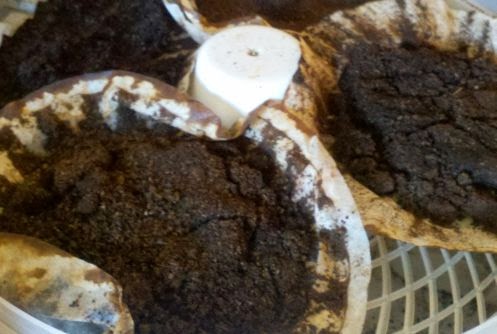Putting Coffee Grounds Down the Sink: Yes or No? - Considerations You Should Know
Putting Coffee Grounds Down the Sink: Yes or No? - Considerations You Should Know
Blog Article
They are making a number of good points about What are the consequences of putting coffee grounds in general in the content directly below.

If you're an avid coffee enthusiast, you could be questioning the very best way to deal with your coffee premises. While it might seem convenient to clean them down the sink, this method can lead to numerous problems for both your plumbing and the environment. In this write-up, we'll check out whether it's secure to put coffee premises down the sink and go over alternative disposal techniques to consider.
Alternatives to Disposing of Coffee Grounds
Garbage Disposal
If you do not have a composting configuration, another alternative is to just toss your coffee premises in the garbage. Make sure to seal them in a compostable bag or container to stop smells and leakage. While this method doesn't provide the same ecological advantages as composting, it's a safe and convenient way to deal with coffee grounds.
Composting
One environmentally friendly alternative for disposing of coffee grounds is to compost them. Coffee grounds are abundant in nitrogen, making them a superb enhancement to compost heap or containers. As they disintegrate, they include nutrients to the dirt, boosting its fertility and appearance.
Dangers of Putting Coffee Grounds Down the Sink
Plumbing Issues
Among the key worry about disposing of coffee grounds down the sink is the risk of blocking your pipelines. Coffee grounds don't dissolve in water and can build up gradually, developing a dense sludge that can block drains pipes and cause pricey plumbing repair services.
Environmental Impact
Past the potential damages to your plumbing, putting coffee grounds down the sink can additionally harm the environment. When cleaned into the sewage system, coffee grounds can add to clogs in drain lines and treatment centers. Furthermore, the high concentration of raw material in coffee premises can deplete oxygen degrees in rivers, negatively influencing aquatic life.
Tips for Proper Disposal
Normal Maintenance
Regardless of just how you choose to take care of your coffee grounds, it's essential to maintain your plumbing regularly. Schedule regular drainpipe cleansings to eliminate any type of buildup and guarantee that your pipes continue to be clear and free-flowing.
Utilize a Sink Strainer
To stop coffee grounds from entering your sink's drainpipe to begin with, think about utilizing a sink strainer. These low-cost gadgets catch solid particles, consisting of coffee grounds, avoiding them from creating obstructions.
Conclusion
While it may be tempting to clean coffee premises down the sink for benefit, doing so can have severe consequences for your plumbing and the setting. Rather, think about composting your coffee premises or taking care of them in the trash. By embracing liable disposal practices, you can enjoy your coffee guilt-free while lessening your eco-friendly impact.
Coffee Grounds Down The Drain: Are They OK?
Can Coffee Grounds Go Down the Sink?
You may be thinking, “But I pour them down the sink drain every day and I’ve never had a clogged drain!” You see, coffee grounds come from coffee beans, which are virtually rock hard by the time they’re ground and brewed. You certainly wouldn’t want to grind up the pit from a peach, apricot, or nectarine that is about just as hard because they wouldn’t break down like other foods, and it’s the same with coffee beans!
If you usually grind coffee beans in the garbage disposal because it seems the cleanest and convenient, we don’t fault you for that. And anyone who has ever had to clean up the trash with spilled coffee grounds after a dog got into it would understand the rationale. Unfortunately, coffee grounds do not break down in water, so instead of grinding up and washing away as normal foods do in a garbage disposal, they clump together and as time goes by, the grounds can form a clump and pack the drain until it develops a clog.
What to Do With Coffee Grounds
So, what do you do with coffee grounds if you can't put them down the drain? You could of course just throw them in the garbage, but we encourage you to give these practical uses for them a try!
Since coffee grounds contain key minerals for plant growth, you can use them to fertilize your garden. Coffee grounds not only fertilize gardens because they are mineral-rich, but they are also great at absorbing contaminants in the soil, particularly heavy metals. Coffee grounds are said to attract worms, which help gardens flourish. You can use coffee grounds as fertilizer by sprinkling them around your plants. You can compost your coffee grounds and use them at a later time. Coffee grounds are great insect repellents when you place them in bowls or sprinkle them around the areas you want to repel insects. To remove fleas from your dog or cat, simply shampoo your pet then rub coffee grounds throughout their fur. Rinse them off and dry as usual. Like baking soda, used coffee grounds can eliminate odors. You can place them in a bowl in the fridge and let them do the work! Mix coffee grounds with coconut oil for a wonderful face or body scrub, or to reduce the appearance of cellulite. https://www.wintershomeservices.com/blog/2019/august/coffee-grounds-down-the-drain-are-they-ok-/

Do you really like reading up on What are the consequences of putting coffee grounds? Make feedback directly below. We'd be interested to see your views about this piece. We are looking forward that you come back again later on. Sharing is nice. Helping others is fun. We truly appreciate reading our article about Is it safe to dispose of coffee grounds down the sink?.
Suggested Site Report this page